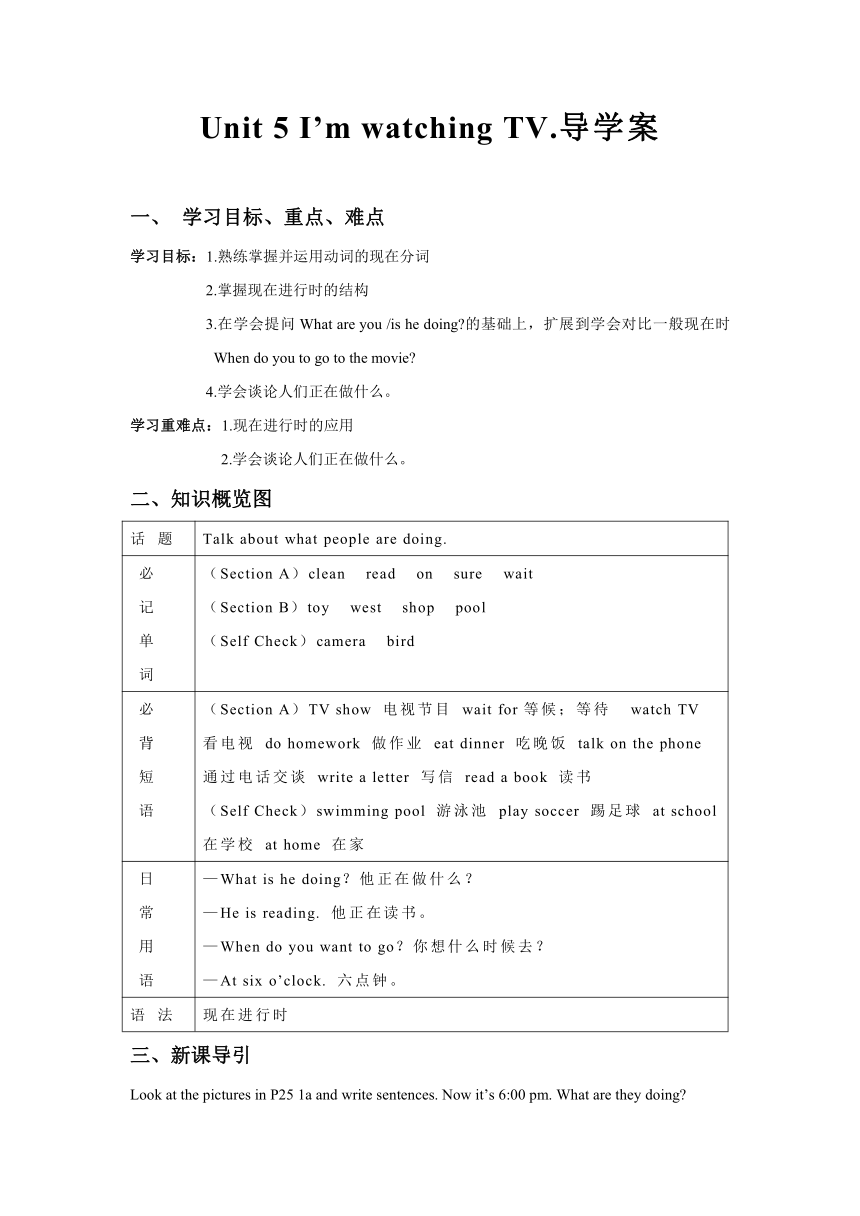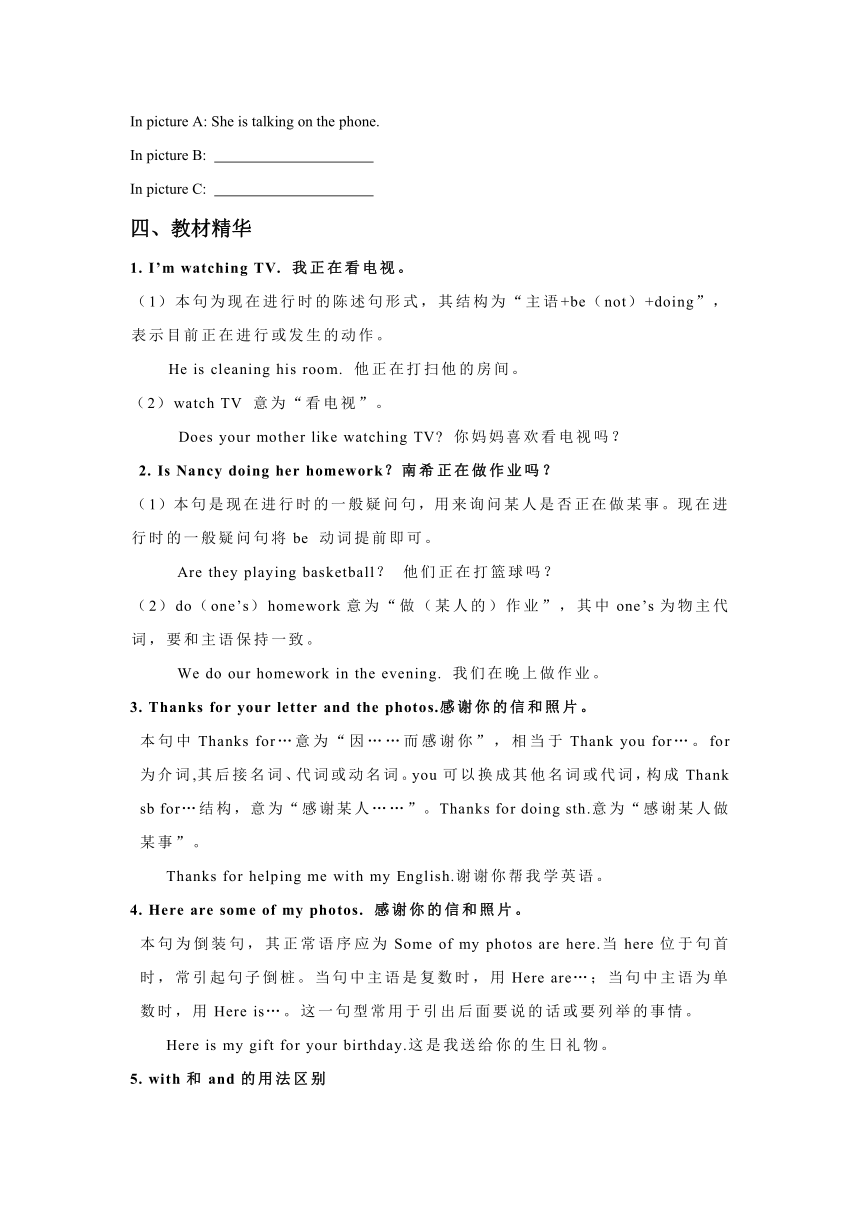Unit 5I’m watching TV导学案
文档属性
| 名称 | Unit 5I’m watching TV导学案 |

|
|
| 格式 | zip | ||
| 文件大小 | 16.4KB | ||
| 资源类型 | 教案 | ||
| 版本资源 | 人教新目标(Go for it)版 | ||
| 科目 | 英语 | ||
| 更新时间 | 2012-02-14 00:00:00 | ||
图片预览


文档简介
Unit 5 I’m watching TV.导学案
学习目标、重点、难点
学习目标:1.熟练掌握并运用动词的现在分词
2.掌握现在进行时的结构
3.在学会提问What are you /is he doing 的基础上,扩展到学会对比一般现在时When do you to go to the movie
4.学会谈论人们正在做什么。
学习重难点:1.现在进行时的应用
2.学会谈论人们正在做什么。
二、知识概览图
话 题 Talk about what people are doing.
必记单词 (Section A)clean read on sure wait(Section B)toy west shop pool(Self Check)camera bird
必背短语 (Section A)TV show 电视节目 wait for等候;等待 watch TV看电视 do homework 做作业 eat dinner 吃晚饭 talk on the phone通过电话交谈 write a letter 写信 read a book 读书(Self Check)swimming pool 游泳池 play soccer 踢足球 at school在学校 at home 在家
日常用语 —What is he doing?他正在做什么?—He is reading. 他正在读书。—When do you want to go?你想什么时候去?—At six o’clock. 六点钟。
语 法 现在进行时
三、新课导引
Look at the pictures in P25 1a and write sentences. Now it’s 6:00 pm. What are they doing
In picture A: She is talking on the phone.
In picture B:
In picture C:
四、教材精华
1. I’m watching TV. 我正在看电视。
(1)本句为现在进行时的陈述句形式,其结构为“主语+be(not)+doing”,表示目前正在进行或发生的动作。
He is cleaning his room. 他正在打扫他的房间。
(2)watch TV 意为“看电视”。
Does your mother like watching TV 你妈妈喜欢看电视吗?
2. Is Nancy doing her homework?南希正在做作业吗?
(1)本句是现在进行时的一般疑问句,用来询问某人是否正在做某事。现在进行时的一般疑问句将be 动词提前即可。
Are they playing basketball? 他们正在打篮球吗?
(2)do(one’s)homework意为“做(某人的)作业”,其中one’s为物主代词,要和主语保持一致。
We do our homework in the evening. 我们在晚上做作业。
3. Thanks for your letter and the photos.感谢你的信和照片。
本句中Thanks for…意为“因……而感谢你”,相当于Thank you for…。for为介词,其后接名词、代词或动名词。you可以换成其他名词或代词,构成Thank sb for…结构,意为“感谢某人……”。Thanks for doing sth.意为“感谢某人做某事”。
Thanks for helping me with my English.谢谢你帮我学英语。
4. Here are some of my photos. 感谢你的信和照片。
本句为倒装句,其正常语序应为Some of my photos are here.当here位于句首时,常引起句子倒桩。当句中主语是复数时,用Here are…;当句中主语为单数时,用Here is…。这一句型常用于引出后面要说的话或要列举的事情。
Here is my gift for your birthday.这是我送给你的生日礼物。
5. with和and的用法区别
with意为“和……一起”时,一般作伴随状语,放在句尾,有时放在主语之后,谓语动词的形式取决于前面的主语,而不看with后面的对象;and意为“和”,用来连接两个并列成分,即:前面的成分是主语,则and后面的也为主语。
Lucy often goes to the park with her father.
=Lucy with her father often goes to the park.
=Lucy and her father often go to the park.露西经常和她的爸爸去公园.
五、语法技巧
现在进行时
(一)用法
1. 现在进行时可以表示说话时正在进行的动作,常与now, right now, at the moment等时间状语及动词look,listen等连用。
He is watching TV now. 他现在正在看电视。
Look! They’re playing soccer.看!他们在踢足球。
2. 现在进行时可以表示目前一段时间内一直进行的动作,常和these days, this week, at present等时间状语连用。
They are working on a farm these days. 这些天他们在农场里干活。
3. 现在进行时可以表示现在不断发展变化的事情。表示渐变的动词有:get, grow, turn, become等。
The leaves are turning yellow.叶子在变黄。
The days are getting shorter and shorter. 白天正变得越来越短。
4. 现在进行时还可以表示将要发生的动作,不过这种用法只限于arrive, begin, go, come, leave, fly等动词。
They’re going to Beijing tomorrow.他们明天将去北京。
(二)构成
1. 现在进行时的谓语由助动词be(am/is/are)+v.-ing构成。
2. v.-ing的构成
(1)一般直接在动词原形后加-ing。
work→working talk→talking
(2)以不发音的字母e结尾的动词,先去e,再加-ing。
make→making invite→inviting
(3)以重读闭音节结尾且末尾只有一个辅音字母的动词,先双写这一辅音字母,再加-ing.
run→running swim→swimming
六、课堂检测
I. 单项填空
1. Don’t turn on the TV. Grandma now.
A. is sleeping B. will sleep C. slept D. sleeps
2. —Are you from America?
—No, none of us.
A. both B. all C. any D. either
3. —Are you writing a letter?
— .
A. Yes, I do B. Yes, I am C. Yes, I don’t D. Yes, I’m not
4. I am talking Frank the sports meeting.
A. about, to B. with, about C. to, with D. with, to
5. I go to school 8 o’clock in the morning.
A. at B. in C. on D. for
II. 根据汉语提示完成句子
1. I have some (玩具).
2. The sun sets in the (西方).
3. Let’s go (购物).
4. We are swimming in the (水池).
III. 用所给词的适当形式填空
1. —What are you doing?
—I’m (read)books.
2. —What are they doing when it is raining?
—They are (lie) on the beach.
3. —Is Nancy doing her homework?
—No, she isn’t. She’s (write)a letter.
4. Look! Sam and Tom (run)on the playground.
5. Listen! Who is (sing) in the next room?
七、体验中考
1.(2010·三亚)Don’t make so much noise. The students an English class.
A. are having B. have C. had D. were having
2.(2010·北京)—What’s your father doing now?
—He the room.
A. cleaned B. cleans C. has cleaned D. is cleaning
3.(2010·娄底)—Where is Peter
—He volleyball with his friends in the school gym.
A. plays B. played C. is playing
4.(2010·上海)Today is Father’s Day. My mother a special dinner for my grandpa now.
A. prepare B. prepared C. is preparing D. will prepare
5.(2010·湖州)—Alice, would you mind not playing the guitar I on the phone.
—Oh, sorry, mom.
A. talked B. talk C. have talked D. am talking
八、学后反思
学习目标、重点、难点
学习目标:1.熟练掌握并运用动词的现在分词
2.掌握现在进行时的结构
3.在学会提问What are you /is he doing 的基础上,扩展到学会对比一般现在时When do you to go to the movie
4.学会谈论人们正在做什么。
学习重难点:1.现在进行时的应用
2.学会谈论人们正在做什么。
二、知识概览图
话 题 Talk about what people are doing.
必记单词 (Section A)clean read on sure wait(Section B)toy west shop pool(Self Check)camera bird
必背短语 (Section A)TV show 电视节目 wait for等候;等待 watch TV看电视 do homework 做作业 eat dinner 吃晚饭 talk on the phone通过电话交谈 write a letter 写信 read a book 读书(Self Check)swimming pool 游泳池 play soccer 踢足球 at school在学校 at home 在家
日常用语 —What is he doing?他正在做什么?—He is reading. 他正在读书。—When do you want to go?你想什么时候去?—At six o’clock. 六点钟。
语 法 现在进行时
三、新课导引
Look at the pictures in P25 1a and write sentences. Now it’s 6:00 pm. What are they doing
In picture A: She is talking on the phone.
In picture B:
In picture C:
四、教材精华
1. I’m watching TV. 我正在看电视。
(1)本句为现在进行时的陈述句形式,其结构为“主语+be(not)+doing”,表示目前正在进行或发生的动作。
He is cleaning his room. 他正在打扫他的房间。
(2)watch TV 意为“看电视”。
Does your mother like watching TV 你妈妈喜欢看电视吗?
2. Is Nancy doing her homework?南希正在做作业吗?
(1)本句是现在进行时的一般疑问句,用来询问某人是否正在做某事。现在进行时的一般疑问句将be 动词提前即可。
Are they playing basketball? 他们正在打篮球吗?
(2)do(one’s)homework意为“做(某人的)作业”,其中one’s为物主代词,要和主语保持一致。
We do our homework in the evening. 我们在晚上做作业。
3. Thanks for your letter and the photos.感谢你的信和照片。
本句中Thanks for…意为“因……而感谢你”,相当于Thank you for…。for为介词,其后接名词、代词或动名词。you可以换成其他名词或代词,构成Thank sb for…结构,意为“感谢某人……”。Thanks for doing sth.意为“感谢某人做某事”。
Thanks for helping me with my English.谢谢你帮我学英语。
4. Here are some of my photos. 感谢你的信和照片。
本句为倒装句,其正常语序应为Some of my photos are here.当here位于句首时,常引起句子倒桩。当句中主语是复数时,用Here are…;当句中主语为单数时,用Here is…。这一句型常用于引出后面要说的话或要列举的事情。
Here is my gift for your birthday.这是我送给你的生日礼物。
5. with和and的用法区别
with意为“和……一起”时,一般作伴随状语,放在句尾,有时放在主语之后,谓语动词的形式取决于前面的主语,而不看with后面的对象;and意为“和”,用来连接两个并列成分,即:前面的成分是主语,则and后面的也为主语。
Lucy often goes to the park with her father.
=Lucy with her father often goes to the park.
=Lucy and her father often go to the park.露西经常和她的爸爸去公园.
五、语法技巧
现在进行时
(一)用法
1. 现在进行时可以表示说话时正在进行的动作,常与now, right now, at the moment等时间状语及动词look,listen等连用。
He is watching TV now. 他现在正在看电视。
Look! They’re playing soccer.看!他们在踢足球。
2. 现在进行时可以表示目前一段时间内一直进行的动作,常和these days, this week, at present等时间状语连用。
They are working on a farm these days. 这些天他们在农场里干活。
3. 现在进行时可以表示现在不断发展变化的事情。表示渐变的动词有:get, grow, turn, become等。
The leaves are turning yellow.叶子在变黄。
The days are getting shorter and shorter. 白天正变得越来越短。
4. 现在进行时还可以表示将要发生的动作,不过这种用法只限于arrive, begin, go, come, leave, fly等动词。
They’re going to Beijing tomorrow.他们明天将去北京。
(二)构成
1. 现在进行时的谓语由助动词be(am/is/are)+v.-ing构成。
2. v.-ing的构成
(1)一般直接在动词原形后加-ing。
work→working talk→talking
(2)以不发音的字母e结尾的动词,先去e,再加-ing。
make→making invite→inviting
(3)以重读闭音节结尾且末尾只有一个辅音字母的动词,先双写这一辅音字母,再加-ing.
run→running swim→swimming
六、课堂检测
I. 单项填空
1. Don’t turn on the TV. Grandma now.
A. is sleeping B. will sleep C. slept D. sleeps
2. —Are you from America?
—No, none of us.
A. both B. all C. any D. either
3. —Are you writing a letter?
— .
A. Yes, I do B. Yes, I am C. Yes, I don’t D. Yes, I’m not
4. I am talking Frank the sports meeting.
A. about, to B. with, about C. to, with D. with, to
5. I go to school 8 o’clock in the morning.
A. at B. in C. on D. for
II. 根据汉语提示完成句子
1. I have some (玩具).
2. The sun sets in the (西方).
3. Let’s go (购物).
4. We are swimming in the (水池).
III. 用所给词的适当形式填空
1. —What are you doing?
—I’m (read)books.
2. —What are they doing when it is raining?
—They are (lie) on the beach.
3. —Is Nancy doing her homework?
—No, she isn’t. She’s (write)a letter.
4. Look! Sam and Tom (run)on the playground.
5. Listen! Who is (sing) in the next room?
七、体验中考
1.(2010·三亚)Don’t make so much noise. The students an English class.
A. are having B. have C. had D. were having
2.(2010·北京)—What’s your father doing now?
—He the room.
A. cleaned B. cleans C. has cleaned D. is cleaning
3.(2010·娄底)—Where is Peter
—He volleyball with his friends in the school gym.
A. plays B. played C. is playing
4.(2010·上海)Today is Father’s Day. My mother a special dinner for my grandpa now.
A. prepare B. prepared C. is preparing D. will prepare
5.(2010·湖州)—Alice, would you mind not playing the guitar I on the phone.
—Oh, sorry, mom.
A. talked B. talk C. have talked D. am talking
八、学后反思
同课章节目录
- Unit 1 Can you play the guitar?
- Section A
- Section B
- Unit 2 What time do you go to school?
- Section A
- Section B
- Unit 3 How do you get to school?
- Section A
- Section B
- Unit 4 Don't eat in class.
- Section A
- Section B
- Unit 5 Why do you like pandas?
- Section A
- Section B
- Unit 6 I'm watching TV.
- Section A
- Section B
- Review of Units 1-6
- Unit 7 It's raining!
- Section A
- Section B
- Unit 8 Is there a post office near here?
- Section A
- Section B
- Unit 9 What does he look like?
- Section A
- Section B
- Unit 10 I'd like some noodles.
- Section A
- Section B
- Unit 11 How was your school trip?
- Section A
- Section B
- Unit 12 What did you do last weekend?
- Section A
- Section B
